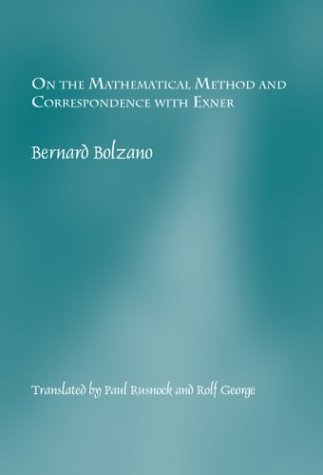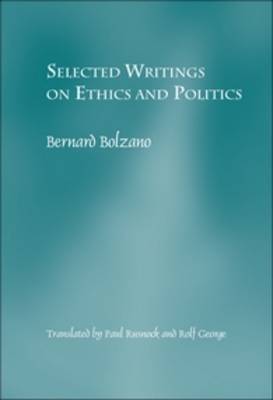Studien zur OEsterreichischen Philosophie
2 primary works
Book 37
On the Mathematical Method and Correspondence with Exner
by Bernard Bolzano
Published 1 January 2004
The Prague Philosopher Bernard Bolzano (1781-1848) has long been admired for his groundbreaking work in mathematics: his rigorous proofs of fundamental theorems in analysis, his construction of a continuous, nowhere-differentiable function, his investigations of the infinite, and his anticipations of Cantor's set theory. He made equally outstanding contributions in philosophy, most notably in logic and methodology. One of the greatest mathematician-philosophers since Leibniz, Bolzano is now widely recognised as a major figure of nineteenth-century philosophy.
Praised by Husserl as "one of the greatest logicians of all times," he has also been recognised by Michael Dummett as one of the first modern analytic philosophers and by Alberto Coffa as the founder of the "semantic tradition." This volume contains English translations of the essay "On the Mathematical Method," a concise introduction to Bolzano's logic and philosophy of mathematics, as well as substantial selections from his correspondence with Franz Exner, Professor of Philosophy at the Charles University in Prague in the 1830s and 40s. It will be of interest to students of Austrian philosophy, the development of analytic philosophy, the philosophy of language, and the history and philosophy of logic and mathematics.
Praised by Husserl as "one of the greatest logicians of all times," he has also been recognised by Michael Dummett as one of the first modern analytic philosophers and by Alberto Coffa as the founder of the "semantic tradition." This volume contains English translations of the essay "On the Mathematical Method," a concise introduction to Bolzano's logic and philosophy of mathematics, as well as substantial selections from his correspondence with Franz Exner, Professor of Philosophy at the Charles University in Prague in the 1830s and 40s. It will be of interest to students of Austrian philosophy, the development of analytic philosophy, the philosophy of language, and the history and philosophy of logic and mathematics.
Book 40
Celebrated today for his groundbreaking work in logic and the foundations of mathematics, Bernard Bolzano (1781-1848) was best known in his own time as a leader of the reform movement in his homeland (Bohemia, then part of the Austrian Empire). As professor of religious science at the Charles University in Prague from 1805 to 1819, Bolzano was a highly visible public intellectual, a courageous and determined critic of abuses in Church and State. Based in large part on a carefully argued utilitarian practical philosophy, he developed a non-violent program for the reform of the authoritarian institutions of the Empire, which he himself set in motion through his teaching and other activities. Rarely has a philosopher had such a great impact on the political culture of his homeland.
This volume contains a substantial collection of Bolzano's writings on ethics and politics, translated into English for the first time. It includes a complete translation of the treatise On the Best State, his principal writings on ethics, an essay on the contemporary situation in Ireland, and a selection of his Exhortations, dealing with such topics as enlightenment, civil disobedience, the status of women, anti-Semitism and Czech-German relations in Bohemia. It will be of particular interest to students of central European philosophy and history, and more generally to philosophers and historians of ideas.
This volume contains a substantial collection of Bolzano's writings on ethics and politics, translated into English for the first time. It includes a complete translation of the treatise On the Best State, his principal writings on ethics, an essay on the contemporary situation in Ireland, and a selection of his Exhortations, dealing with such topics as enlightenment, civil disobedience, the status of women, anti-Semitism and Czech-German relations in Bohemia. It will be of particular interest to students of central European philosophy and history, and more generally to philosophers and historians of ideas.

